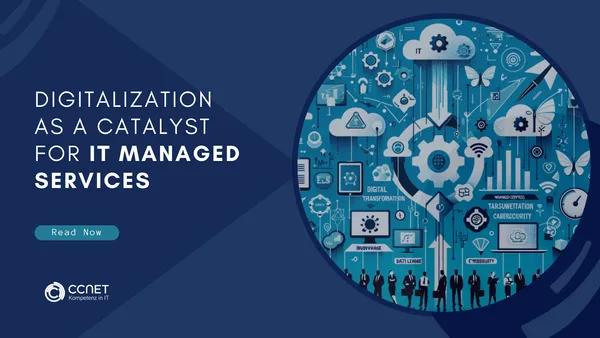
CCNet
May 1, 2024 • 2 min read

Digitalization as a Catalyst for Managed Services
In today's information technology landscape, digitalization has become more than an alternative; it's now a vital requirement for businesses of all scales. This swift transformation has sparked a rising need for IT Managed Services that extend beyond basic support and serve as catalysts for digital evolution.
The Role of Digitalization
Digitalization fundamentally changes the way business is conducted. It allows companies to optimize processes, enhance customer experiences, and develop new business models. However, with these opportunities come challenges, especially regarding IT infrastructure and security. This is where Managed Services come into play.
From Support to Transformation
Managed Services Providers (MSPs) have expanded their offerings to provide not just support and maintenance but also strategic consulting and solutions for digital transformation. They assist businesses in implementing cloud technologies, effectively using data, and minimizing cybersecurity risks. This development shows that MSPs are no longer just service providers but strategic partners in the journey of digital transformation.
Specialization and Expertise
A key factor driving the demand for Managed Services is the need for specialized knowledge. The IT landscape is evolving so rapidly that it is difficult for businesses to keep up with all the new technologies internally. MSPs provide access to expertise in areas such as cloud computing, artificial intelligence, and big data, which is invaluable for businesses.
Case Studies
A good example of the role of Managed Services in digitalization is the introduction of cloud-based workplaces. An MSP can not only handle the migration to cloud services but also ensure ongoing management and optimization. Another example is the development and implementation of security strategies to protect company data in an increasingly connected world.
Future Perspectives
The future envisions an even closer integration of Managed Services into the digital strategy of companies. With the advancement of technologies such as the Internet of Things (IoT) and machine learning, MSPs will play a central role in enabling these new opportunities. They will act not just as service providers but as innovators and pioneers of the digital revolution.
Conclusion
Managed Services have evolved from a support function to a central element of digital transformation. Their role in enabling digitalization is undeniable and will continue to grow as businesses seek ways to leverage the latest technologies to remain competitive and thrive. In this new era, MSPs are not just helpers but innovators guiding companies through the digital landscape.
Further information can be found here: IT Managed Services
FAQs about IT managed services Digitalization
Why has digitalization become indispensable for companies?
Because it optimizes processes, improves customer experiences, and enables new business models—thereby ensuring competitiveness.
What role do managed services play in digitalization?
They are no longer just support service providers, but strategic partners who actively shape the digital transformation.
How do managed services specifically support digital transformation?
Through the implementation of cloud technologies, data management, and the development of security strategies.
Why do companies need specialized managed services?
The IT landscape is changing rapidly – MSPs offer the necessary expertise that is often not available internally.
What are typical examples of managed services in digitalization?
Cloud-based workplaces or security concepts for protecting company data in networked environments.
What technological trends are influencing the future of managed services?
The Internet of Things (IoT), machine learning, and artificial intelligence will further strengthen the role of MSPs.
How are MSPs changing as a result of these developments?
They are transforming from service providers to innovators and strategic partners for their customers.


